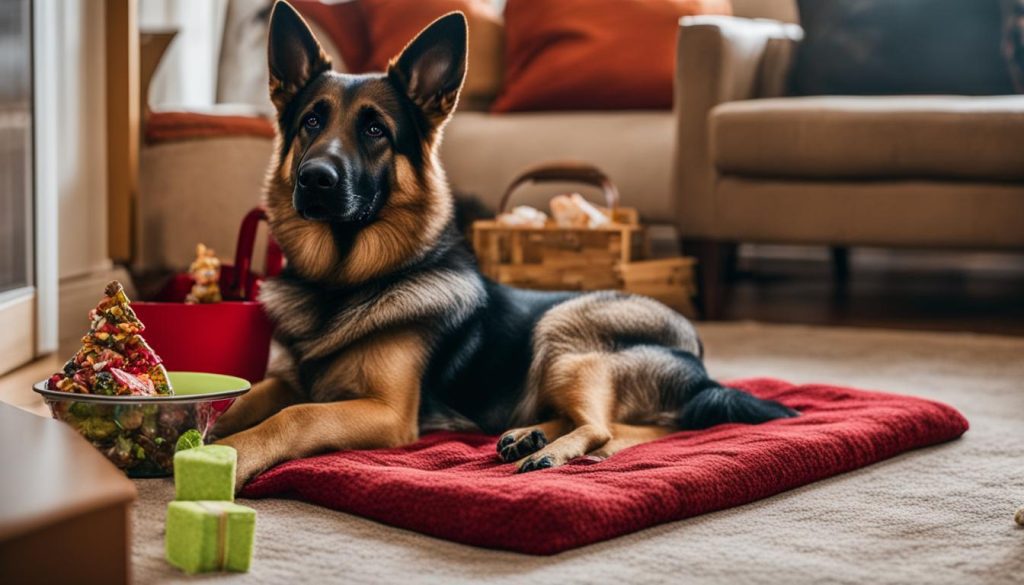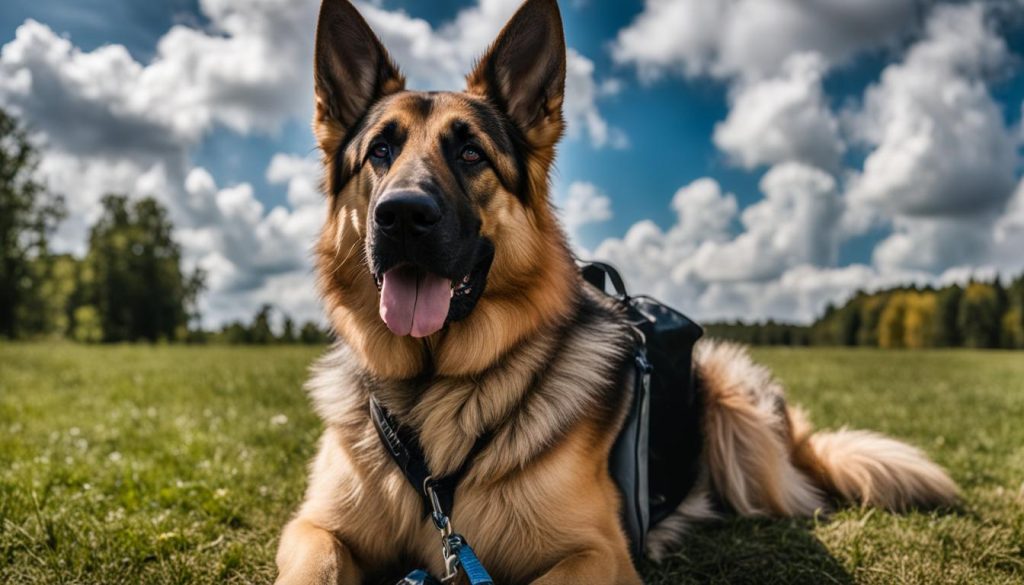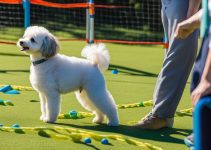When it comes to training an Old German Shepherd Dog (GSD), starting early is key. GSDs are intelligent and trainable, but they require consistent and ongoing training throughout their lives. Whether you’re working with a young puppy or an older GSD, proper training is essential for a well-behaved and happy canine companion.
Before diving into the Old German Shepherd Dog training process, it’s important to find a reputable breeder or rescue organization to ensure you’re selecting the right GSD for your specific needs and lifestyle. Once you have your furry friend by your side, you can embark on an exciting journey of Old German Shepherd Dog training and bonding.
Training a German Shepherd involves various aspects, from establishing obedience to addressing specific behaviors. In this training guide, I’ll walk you through the essential steps of training and provide useful tips to help you along the way.
How to Do Old German Shepherd Dog Training
- Start training your German Shepherd from a young age to establish good behavior habits.
- Choose a reputable breeder or rescue organization to find the right GSD for you.
- Consistency is key in GSD training. Ongoing training throughout their lives will yield the best results.
- Utilize positive reinforcement techniques to motivate and reward your GSD during training sessions.
- Remember to socialize your German Shepherd to different people, environments, and situations to build their confidence.
Socialization for Old German Shepherd Dogs
Socialization plays a crucial role in Old German Shepherd Dog training. As a responsible dog owner, it is important to expose your German Shepherd puppy to various people and situations to build their confidence and prevent fear or aggression.
German Shepherds are known for their protective nature, and socialization helps them differentiate between friendly strangers and potential threats. By safely exposing your puppy to new sights, sounds, and smells, you are providing them with valuable experiences that contribute to their development and confidence.
During the critical period of socialization, which typically occurs between 8 to 16 weeks, it is essential to introduce your puppy to different environments, such as parks, outdoor cafes, and crowded streets. This exposure will help them become comfortable with various stimuli and teach them how to interact appropriately with people and other animals.
When socializing your German Shepherd puppy, it is important to ensure their safety and well-being. Gradually expose them to new experiences, building up their tolerance levels and providing positive reinforcement for confident and appropriate behavior.
Remember, the goal of socialization is to help your German Shepherd puppy develop into a well-rounded and well-behaved adult dog. By creating positive experiences and reinforcing positive interactions, you can lay the foundation for a lifetime of social confidence for your beloved furry companion.
Crate Training and Housetraining for Old German Shepherd Dogs
When it comes to housetraining your old German Shepherd Dog (GSD), crate training can be a valuable tool. Not only does it help with housebreaking, but it also provides your GSD with a safe and secure space of their own. Crate training involves gradually acclimating your dog to their crate, making it a positive and comfortable environment.
Crate training is particularly effective for housetraining because it establishes a routine and helps prevent accidents indoors. By creating a designated space for your GSD, you can teach them to hold their bladder and bowel movements until they are taken outside. This consistency in their routine helps reinforce the concept of going to the bathroom outside.
It’s important to supervise your GSD during the housetraining process. By keeping an eye on them, you can quickly intervene and redirect their behavior if they show signs of needing to use the bathroom. You can gradually increase their freedom in the house as they demonstrate consistent housetraining skills.
In addition to housetraining, crate breaks can also help your GSD acclimate to being alone and reduce the risk of separation anxiety. Leaving your dog alone in the crate for short periods of time when you are home will help them become comfortable with being by themselves.
Consistency in training methods is key to successful housetraining. Establish a clear schedule for feeding, bathroom breaks, and playtime. Be patient and give your GSD plenty of positive reinforcement for their successful housetraining efforts.
The Benefits of Crate Training:
- Establishes a routine for housetraining
- Provides a safe and secure space for your GSD
- Aids in preventing accidents indoors
- Reduces the risk of separation anxiety
Remember, crate training should always be done in a positive and gentle manner. Avoid using the crate as a form of punishment, as this will create negative associations for your GSD. With consistent Old German Shepherd Dog training, patience, and supervision, you can successfully housetrain your old German Shepherd Dog.

Obedience Training for Old German Shepherd Dogs
If you own an old German Shepherd Dog (GSD), you may already be familiar with their strong work ethic and intelligence. Obedience training is an essential part of their development, allowing them to become well-mannered and obedient companions. By teaching your GSD basic commands and enrolling them in obedience classes, you can further enhance their training and socialization skills.
Basic Commands and Walks
A great place to start with obedience training is by teaching your GSD basic commands such as sit, down, and stay. These commands provide the foundation for more advanced training and help establish your position as the pack leader. Remember to use positive reinforcement, rewarding your dog with treats or praise when they successfully follow a command.
Additionally, loose-leash walking is an important skill for both you and your dog. Teaching your GSD to walk nicely on a leash will make walks more enjoyable and safe for everyone involved. Practice walking on different surfaces and gradually increase distractions to improve your dog’s focus and obedience skills.
Puppy Obedience Classes
Enrolling your GSD in a puppy obedience class can be a valuable experience for both owners and dogs. These classes provide structured training sessions and socialization opportunities with other puppies. Trained instructors guide you through exercises that strengthen your dog’s obedience skills and teach you effective training techniques. Additionally, these classes offer a chance for your GSD to interact with unfamiliar people and dogs, improving their socialization skills.
Canine Good Citizen (CGC) Training
If you want to take your GSD’s obedience training to the next level, consider enrolling them in Canine Good Citizen (CGC) training. The CGC program evaluates dogs on their obedience and manners in various everyday situations. By completing the CGC training and passing the evaluation, your GSD will receive a certificate recognizing their good behavior. CGC training is a great way to challenge your dog’s abilities and showcase their obedience skills.
Overall, obedience training plays a vital role in shaping your old German Shepherd into a well-behaved and obedient companion. By teaching them basic commands, enrolling in obedience classes, and exploring advanced training options like CGC training, you can optimize their learning potential and strengthen the bond between you and your GSD.
Recall and Impulse Control Training for Old German Shepherd Dogs
When it comes to Old German Shepherd Dog training, recall training and impulse control are crucial skills that need to be mastered. Recall training ensures that your dog comes back to you when called, promoting their safety and allowing you to maintain control in various situations. Impulse control, on the other hand, helps prevent problem behaviors such as excessive barking, digging, and chasing, ensuring a well-behaved and obedient companion.
Recall training requires time, practice, and patience. Start by practicing in a controlled environment without distractions and gradually increase the difficulty level. Use positive reinforcement techniques, like treats or praise, to reward your GSD for coming to you. Consistency is key, so be sure to practice recall training regularly to reinforce the behavior.
Impulse control training can be incorporated into your GSD’s daily routine. Teach them to wait patiently for their food, toys, or treats, and gradually increase the duration of their wait. Using verbal cues, such as “wait” or “stay,” will help your GSD understand your expectations. Again, positive reinforcement is essential in this training process.
Expanding Training Activities
Once your GSD has mastered recall and impulse control, you can introduce them to advanced training activities, such as tracking, scent work, protection work, agility, and herding. These activities not only provide mental stimulation for your GSD but also tap into their natural instincts and abilities. Tracking and scent work engage their excellent sense of smell, while agility and herding allow them to showcase their athleticism and intelligence.
Introduce these activities gradually and seek guidance from professional trainers who specialize in each discipline. They can provide valuable insights and help you and your GSD progress in a safe and effective manner. Remember to always prioritize your dog’s well-being and enjoyment during the Old German Shepherd Dog training sessions.
By incorporating recall and impulse control training into your GSD’s routine and exploring advanced activities, you will strengthen the bond between you and your dog while nurturing their obedience skills, focus, and overall development.

Continue reading to discover the comprehensive training regimen for old German Shepherd dogs, covering various aspects of their development and behavior.
Training Regimen for Old German Shepherd Dogs
Training a mature German Shepherd requires a consistent and dedicated approach. It is important to understand that German Shepherds mature at different ages, with males typically reaching adulthood later than females. Regardless of their age, ongoing training is crucial for their well-being and development.
Consistency is key when it comes to Old German Shepherd Dog training. Establishing a regular training routine and sticking to it will help reinforce desired behaviors and prevent regression. By providing constant work and engagement, you can keep your dog mentally stimulated and prevent boredom.
Older German Shepherds, with their intelligence and versatility, benefit greatly from outlets for their intelligence. Engaging them in dog sports, puzzle toys, or mental stimulation activities can help satisfy their natural curiosity and prevent destructive behaviors that may arise from boredom.
When it comes to training methods, positive reinforcement is highly recommended for German Shepherds. This approach focuses on rewarding desired behaviors with treats, praise, or affection. Positive reinforcement helps build a strong bond between you and your dog while making the training experience enjoyable and effective.
Benefits of an Old German Shepherd Dog Training Regimen
- Enhances obedience skills and responsiveness
- Improves mental and physical well-being
- Strengthens the bond between owner and dog
- Prevents behavioral issues such as aggression or anxiety
- Fosters a well-rounded and happy dog
By maintaining a consistent and positive Old German Shepherd Dog training regimen, you can help your old German Shepherd thrive and enjoy a fulfilling life. Remember to be patient, understanding, and always prioritize their well-being.
Conclusion
Old German Shepherd Dog training requires consistency, patience, and an understanding of their unique needs. It is crucial to start training from a young age and continue the training throughout their development. This not only helps in shaping their behavior but also strengthens the bond between you and your furry companion.
Socialization plays a vital role in a German Shepherd’s training journey. By exposing them to various people, environments, and situations, you can help them develop confidence and prevent fear or aggression. Additionally, crate training and housetraining should be introduced early on to establish routine and prevent accidents indoors.
Obedience training, recall training, and impulse control are important aspects of their training regimen. Teaching your German Shepherd basic commands and ensuring that they come when called are essential for their safety and well-being. Providing outlets for their intelligence such as dog sports or mental stimulation is also crucial to keep them engaged and prevent boredom. Positive reinforcement training methods yield the best results and help in shaping their behavior effectively.
With proper training and ongoing commitment, your old German Shepherd can lead a happy and fulfilling life. Remember, it’s never too late to train a senior German Shepherd. By understanding their specific needs and tailoring the Old German Shepherd Dog training that suit them, you can further strengthen your bond and create a harmonious relationship with your canine companion.
FAQ
At what age should I start training my Old German Shepherd Dog?
It is important to start training your German Shepherd Dog (GSD) from a young age.
How important is socialization for Old German Shepherd Dogs?
Socialization plays a crucial role in the training of GSDs. It is important to expose your puppy to various people and situations to build their confidence and prevent fear or aggression.
How can crate training and housetraining help with Old German Shepherd Dogs?
Crate training is a useful tool for housetraining and providing a safe space for your GSD. It helps with housebreaking by establishing a routine and preventing accidents indoors.
What are some tips for obedience training Old German Shepherd Dogs?
German Shepherds have a strong work ethic and excel in obedience training. Training should start with basic commands like sit, down, and stay, as well as loose-leash walking.
How can I train my Old German Shepherd Dog to come when called and control impulses?
Teaching your GSD to come when called and control their impulses are important aspects of training. Recall training requires time, practice, and patience but is essential for their safety.
What is the training regimen for Old German Shepherd Dogs?
German Shepherds mature at different ages, with males reaching adulthood later than females. Training should continue throughout their development, focusing on consistency and constant work.






